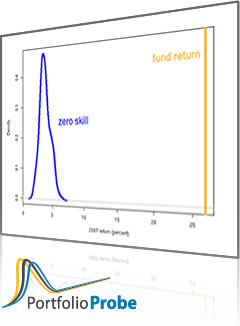Financial mathematicians have built an increasingly elaborate structure around the idea of “the market” … In this article, I intend to challenge some of these foundational concepts with the intention of destabilizing the intellectual structure that has been erected on top of them and to demonstrate how a randomly generated portfolio can beat “the market,” as this term has commonly come to be used.
David Harding in “Some new ideas in financial mathematics”
Heart of the argument
In actual fact, the stock market indexes that are usually described as “the market” are trading systems.
Connections
This obviously relates to random portfolios as generated in Portfolio Probe. The constraints that were used are not disclosed in the article. While a headline like “random portfolios beat the market” is amusing, there are also more serious reasons to use random portfolios.
In spirit the article is akin to “The benchmark gambit”.
Note
There is a typographic problem in the piece on Pensions & Investments where it talks about the number of ways to get 100 stocks out of 500. It says that it is more than 10100. That is a true statement, but I believe what was intended was 10100 (a googol). Actually it is somewhat more than 2 times 10107 (20 million googols).
Thanks to Ron Surz for alerting me to this.

Am I missing something, or the article omits to describe the logic to assign weights? Aside from the obvious statement that there is no market index, and that the imprecise statement that
“the stock market indexes that are usually described as “the market” are trading systems”
(maybe trading policies would be more correct), where are the new ideas?
Gappy,
If you missed it (an explanation of the random portfolio constraints), so did I.
I agree that “trading policy” is a better term.
I think that the “new” idea is that “the market” is not a well-defined concept — “new” need not be “completely original”, merely novel to a particular audience. The audience for which that idea is new is very large.